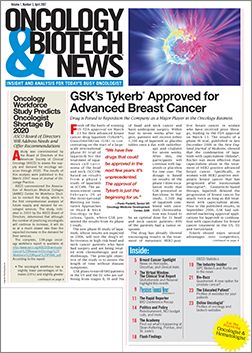Publication
Article
OBTN
GSK's Tykerb® Approved for Advanced Breast Cancer
Author(s):
With FDA approval for their advanced breast cancer drug Tykerb�®, GlaxoSmithKline is poised to reposition itself as a major player in the oncology business.
Click here to view as PDF.
COVER STORY
GSK’s Tykerb® Approved for Advanced Breast Cancer
Drug is Poised to Reposition the Company as a Major Player in the Oncology Business
F
resh offthe heels of winning US FDA approval on March 13 for their advanced breast cancer drug lapatinib (Tykerb®), GlaxoSmithKline (GSK) is concentrating on the start of a large-scale international phase III trial of lapatinib for the treatment of squamous cell carcinoma of the head and neck (SCCHN) based on results from a phase I study of lapatinib in SCCHN. The announcement came February 26 at the International Meeting on Innovative Approaches in Head & Neck Oncology in Barcelona,
Spain, where GSK presented the results from its phase I study.
The new phase III study of lapatinib, whose results are expected in 2008, will test the drug’s effectiveness in high-risk head and
neck cancer patients who have had surgery and are being treated with chemotherapy and radiotherapy. The principle objective
of the study is to assess the length of time without disease symptoms.
GSK plans to enroll 680 patients in the US and the EU who are suffering from stages II, III and IVa of head and neck cancer and
have undergone surgery. Within four to seven weeks after surgery, patients will receive either 1,500 mg of lapatinib or placebo
tables once a day with radiotherapy and cisplatin for seven weeks. After this, the participants will continue with lapatinib or placebos for one year. The dosage is based on results of the phase I dose-escalation study that GSK presented in Barcelona. In that study, 1,500 mg of lapatinib combined with oncedaily chemoradiation was found to be an optimal dose for 31 head and neck cancer patients—89% of the patients had a tumor response.
The drug has already showed encouraging results in the treatment of metastatic HER2-positive breast cancer in women who have received prior therapy, leading to the FDA approval on March 13. The results of a phase III trial, published in late December 2006 in the New England Journal of Medicine, showed that the combination of lapatinib with capecitabine (Xeloda®, Roche) was more effective than capecitabine alone in the treatment of HER2-positive advanced breast cancer. Specifically, in women with HER2-positive metastatic breast cancer that has progressed after trastuzumab (Herceptin®, Genentech)—based therapy, lapatinib delayed the progression of breast cancer for nearly twice as long as did treatment with capecitabine alone. Prior to the published results, in September 2006, GSK had submitted marketing approval applications for lapatinib in combination with capecitabine for breast cancer treatment in the US, EU and Switzerland.
Tykerb should enjoy several advantages over competitors, including its dual tyrosine kinase activity, oral formulation, convenient administration schedule, and favorable toxicity profile. Now approved, Tykerb represents a significant addition to GSK’s oncology portfolio. The company noted that the drug — which will be available by the beginning of April at a cost of $2,900 a month – is the first targeted, once-daily oral compound approved for this patient population in the country, and analysts estimate Tykerb will bring in $258 million for GSK in the US by 2010 and $1.1 billion by 2015. Before Tykerb, the company marketed only three major cancer products, and overall sales have suffered following patent expirations on key products in other disease areas.
“Having already shown such promise as a breast cancer treatment, we are very excited to continue investigating lapatinib in SCCHN,” said Paolo Paoletti, MD, senior vice president of the Oncology Medicine Development Center at GSK. “Lapatinib may represent a new treatment approach to difficult-to-treat tumor types, such as head and neck cancer, offering hope to patients
in need of a further treatment option.”
In addition to Tykerb, GSK has high hopes for pazopanib (a tyrosine kinase inhibitor and angiogenesis inhibitor), HuMax-CD20
(ofatumumab; a fully human, high-affinity antibody targeted at the CD20 molecule in the cell membrane of B-cells), and two
supportive care products—casopitant (a neurokinin 1 [NK1] receptor antagonist) and eltrombopag (small-molecule thrombopoietin receptor agonist). All could be approved between 2007 and 2010.
GSK also has a therapeutic vaccine for lung cancer that is expected to begin final phase III trials this year, as well as several
earlier-stage products. In a phase II, randomized, placebo-controlled trial, patients had tumors expressing a tumor-specific
antigen known as MAGE-A3, which is present in approximately 35% to 50% of early non—small cell lung cancers. The researchers studied 182 patients who received either GSK’s new MAGE-A3 vaccine or placebo. Tolerance was excellent.
“We have five drugs that could be approved in the next few years,” Paoletti said. “It’s unprecedented. The approval of
Tykerb is just the beginning for us.”
